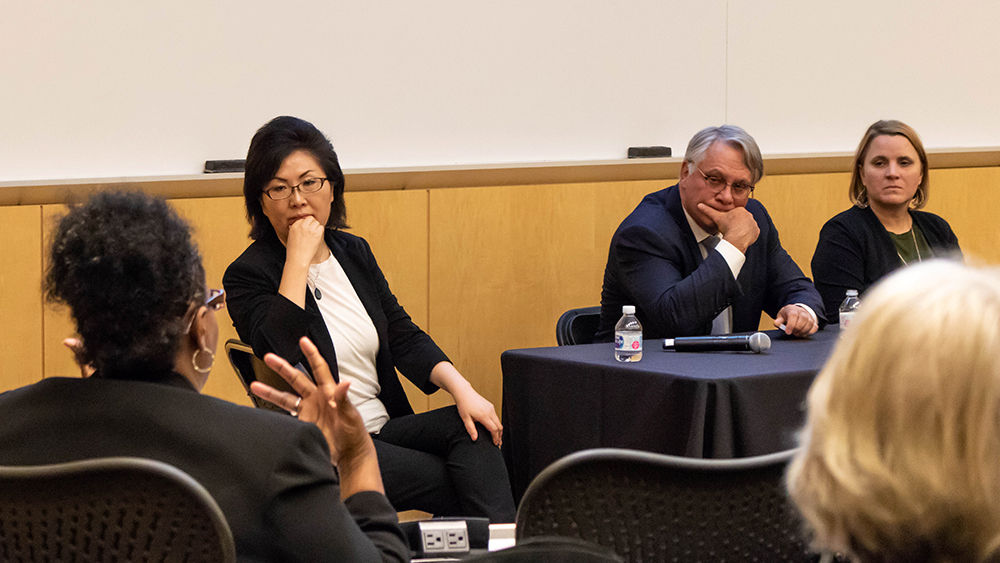Discover Feinberg: Northwestern Breakthroughs Leading the Way to Healthier Aging

On October 1, 2019, three distinguished scientists from Northwestern University Feinberg School of Medicine presented their research on a topic that truly affects everyone: aging. Representing a broad array of medical specialties—neuroscience, cardiology, and cancer epidemiology—they shared how their work is leading to new understandings that may someday help all of us live longer and healthier lives.
“As an academic medical center, research is the basis of everything we do here at Feinberg. Our dean, Eric Neilson, likes to remind us that virtually everything that is currently a therapy began as an experiment in a research laboratory,” said Rex Chisholm, PhD, vice dean for Scientific Affairs and Graduate Education and moderator of this Discover Feinberg event.
SuperAgers, Biomarkers, and Predicting the Future
Emily Rogalski, PhD, professor of Psychiatry and Behavioral Sciences and associate director of the Mesulam Center for Cognitive Neurology and Alzheimer’s Disease, studies a group of people who seem to be immune to the memory decline that typically comes with age. Dr. Rogalski and her team hope to identify what allows these “SuperAgers” to maintain outstanding memory performance into their 80s and beyond.
“This is the type of study that no one was doing several years ago,” she admitted. “It was really thanks to a generous donor here at Northwestern that we were able to start this study. From there, we found genetic factors that are uniquely associated with these individuals.”
Looking at their brains under the microscope, the team found that SuperAgers have an abundance of a cell called von Economo neurons. Findings like this may help clinicians treat neurodegenerative diseases like Alzheimer’s in the future.
“We think this will inform our understanding of aging so that we can better balance lifespan and healthspan,” Dr. Rogalski explained.
Though SuperAgers have remarkable memories despite their age, one’s age is actually the most important risk factor for most diseases, said Douglas Vaughan, MD, chair of Medicine and the Irving S. Cutter Professor of Medicine.
“I’m a cardiologist, so I am particularly interested in age as a risk factor for heart disease,” he shared. “What we’ve found is that age trumps everything: cholesterol, smoking, diabetes, gender.”
But there is a difference between chronological age and molecular age, Dr. Vaughan explained. Looking at variations in a person’s DNA, the length of their telomeres (the ends of their chromosomes), and epigenetics (how gene expression changes based on outside influences such as environmental exposures) can all reveal why someone may look or feel much younger—or older—than their number of years on Earth would suggest.
Dr. Vaughan saw this first-hand in an Amish population in eastern Indiana, whose members have a gene mutation that may defend them from normal biological aging. Deficient in a protein called PAI-1, the carriers of the variant gene have lower rates of diabetes, longer telomeres, and live beyond their counterparts without the mutation. Drugs that target PAI-1 might have a similar effect on the general population.
“We are identifying molecular mechanisms and targets that can be therapeutically manipulated in the future,” Dr. Vaughan said. “I have no doubt that in the next 20 to 30 years we will have therapies to slow or alter the aging process and prolong the healthspan of human beings.”
In the meantime, it’s important to remember that age, as the old saying goes, is just a number, emphasized Lifang Hou, MD, PhD.
“Our age alone does not give us information about our health status and healthspan and the risks we have for different diseases,” said Dr. Hou, director of Feinberg’s Center for Molecular Aging and Cancer and chief of Cancer Epidemiology and Prevention in the Department of Preventive Medicine.
She walked through two case studies comparing two 50-year-old women with vastly different biological ages. The first was a smoker with high blood pressure who didn’t exercise. The second never smoked, had normal blood pressure, and had been physically active. Ten years later, the first has hypertension, type II diabetes, and coronary artery disease, while the second has remained disease free.
Dr. Hou’s team is pursuing studies that follow large populations over the life-course to understand how biological aging biomarkers—the results of interactions among human genetic environmental exposures, lifestyle choices, and social-cultural background—may be used to predict cancer, dementia, cardiovascular disease, and other aging-related characteristics and diseases.
More Research Needed
One takeaway from the Discover Feinberg evening is that the old “diet and exercise” adage is important in combating the effects of aging—and is supported by evidence-based science. Dr. Rogalski also suggested that exercising the brain by taking on new challenges might also keep age-related dementia at bay. But genetics, too, play a role as we get older.
“It’s all about your genome and how you live your life, not one or the other,” summed up Dr. Chisholm. “We need to do a lot more research to really understand the interactions.”
Learn more about the Discover Feinberg lecture series.
Make a gift to support Northwestern University Feinberg School of Medicine.
For more information about supporting these aging studies or other groundbreaking research at Northwestern, please contact MaryPat Mauro at marypat.mauro@northwestern.edu or (312) 503-1090.